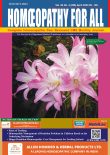Focus on Indian Homoeopathic Educational Sector
Keywords:
establishment, specialization, Homoeopathy, alternative, initial developmentAbstract
Homoeopathy is a widely practiced system of alternative medicine in India, founded on the principle of "like cures like." Its journey in the country began in the early 19th century, with Bengal playing a crucial role in its initial development in India. The system gained traction in both civil and military sectors, thanks in part to Dr Mahendra Lal Sarkar, recognized as the first Indian homoeopath. A landmark in this progress was the establishment of the “Calcutta Homoeopathic Medical College & Hospital” in 1881—the oldest homoeopathic institution in Asia. This college continues to offer BHMS (Bachelor of Homoeopathic Medicine and Surgery) and MD programs, is affiliated with the West Bengal University of Health Sciences (WBUHS), and is recognized by the National Commission for Homoeopathy (NCH) under the Ministry of AYUSH. India is now home to over 170 homoeopathic medical colleges, making it a global hub for homoeopathic education. Among these, National Institute of Homoeopathy (NIH) in Salt Lake, Kolkata, established in 1975, is a premier autonomous institution offering BHMS, MD, and PhD programs. D.N. De Homoeopathic Medical College & Hospital, also in Kolkata and founded in 1927, is another pr




